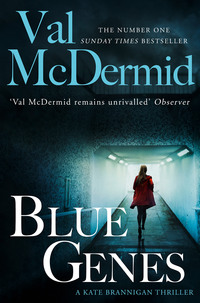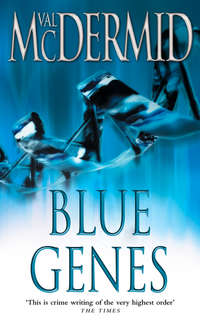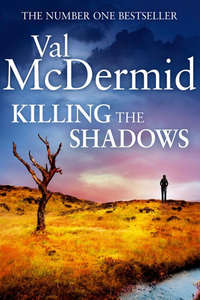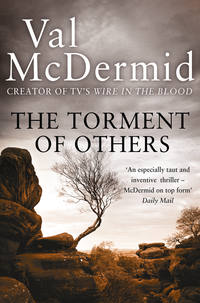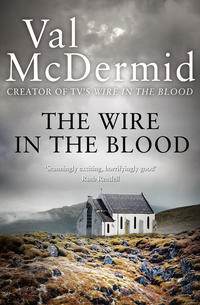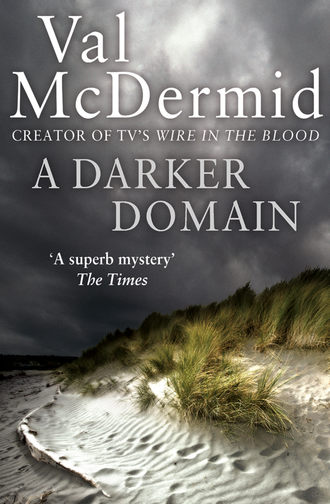
Полная версия
A Darker Domain
Jenny shook her head. ‘Not a scooby. Even though I couldn’t believe it, the scabbing kind of made sense. So I never thought about any other possibility.’
‘Do you think he’d just had enough? Just upped and left?’
She frowned. ‘See, that wouldn’t be like Mick. To leave without the last word? I don’t think so. He’d have made sure I knew it was all my fault.’ She gave a bitter laugh.
‘You don’t think he might have gone without a word as a way of making you suffer even more?’
Jenny’s head reared back. ‘That’s sick,’ she protested. ‘You make him sound like some kind of a sadist. He wasn’t a cruel man, Inspector. Just thoughtless and selfish like the rest of them.’
Karen paused for a moment. This was always the hardest part when interviewing the relatives of the missing. ‘Had he fallen out with anybody? Did he have any enemies, Jenny?’
Jenny looked as if Karen had suddenly switched into Urdu. ‘Enemies? You mean, like somebody that would kill him?’
‘Maybe not mean to kill him. Maybe just fight him?’
This time, Jenny’s laugh had genuine warmth. ‘By Christ, that’s funny coming from you.’ She shook her head. ‘The only physical fights Mick ever got into in all the years we were married were with your lot. On the picket lines. At the demonstrations. Did he have enemies? Aye, the thin blue line. But this isn’t South America, and I don’t recall any talk about the disappeared of the miners’ strike. So the answer to your question is no, he didn’t have the kind of enemies that he’d get into a fight with.’
Karen studied the carpet for a long moment. The gung-ho violence of the police against the strikers had poisoned community relationships for a generation or more. Never mind that the worst offenders came from outside forces, bussed in to make up the numbers and paid obscene amounts of overtime to oppress their fellow citizens in ways most people chose to avoid knowing about. The fallout from their ignorance and arrogance affected every officer in every coalfield force. Still did, Karen reckoned. She took a deep breath and looked up. ‘I’m sorry,’ she said. ‘The way they treated the miners, it was inexcusable. I like to think we wouldn’t act like that now, but I’m probably wrong. Are you sure there wasn’t anybody he’d had a run-in with?’
Jenny didn’t even pause for thought. ‘Not that I knew about. He wasn’t a troublemaker. He had his principles, but he didn’t use them as excuses to pick fights. He stood up for what he believed in, but he was a talker, not a fighter.’
‘What if the talking didn’t work? Would he back down?’
‘I’m not sure I follow you.’
Karen spoke slowly, feeling her way into the idea. ‘I’m wondering if he bumped into this Iain Maclean that day and tried to talk him out of going to Nottingham. And if Iain wouldn’t change his mind, and maybe had his pals there to back him up…Would Mick have got into a fight with them, maybe?’
Jenny shook her head firmly. ‘No way. He’d have said his piece and, if that didn’t work, he’d have walked away.’
Karen felt frustrated. Even after the passage of so much time, cold cases usually provided one or two loose ends to pick away at. But so far, there seemed to be nothing to reach for here. One last question, then she was out of this place. ‘Do you have any idea at all where Mick might have gone painting that day?’
‘He never said. The only thing I can tell you is that in the winter he often went along the shore to East Wemyss. That way, if it came on rain, he could go down to the caves and shelter there. The preservation group, they had a wee bothy at the back of one of the caves with a camping stove where they could brew up. He had keys, he could make himself right at home,’ she added, the acid back in her voice. ‘But I’ve no idea whether he was there that day or not. He could have been anywhere between Dysart and Buckhaven.’ She looked at her watch. ‘That’s all I know.’
Karen got to her feet. ‘I appreciate your time, Mrs Prentice. We will be continuing our inquiries and I’ll keep you informed.’ The Mint scrambled to his feet and followed her and Jenny to the front door.
‘I’m not bothered for myself, you understand,’ Jenny said when they were halfway down the path. ‘But see if you can find him for the bairn’s sake.’
It was, Karen thought, the first sign of emotion she’d shown all morning. ‘Get your notebook out,’ she said to the Mint as they got into the car. ‘Follow-ups. Talk to the neighbour. See if she remembers anything about the day Mick Prentice disappeared. Talk to somebody from the cave group, see who’s still there from 1984. Get another picture of what Mick Prentice was really like. Check in the files for anything about this Andy Kerr, NUM official, supposedly committed suicide around the time Mick disappeared. What’s the story there? And we need to track down these five scabs and get Nottingham to have a chat with them.’ She opened the passenger door again as the Mint finished scribbling. ‘And since we’re here already, let’s have a crack at the neighbour.’
She was barely two steps from the car when her phone rang. ‘Phil,’ she said.
No pleasantries, just straight to the point. ‘You need to get back here right now.’
‘Why?’
‘The Macaroon is on the warpath. Wants to know why the hell you’re not at your desk.’
Simon Lees, Assistant Chief Constable (Crime), was temperamentally different from Karen. She was convinced his bedtime reading consisted of the Police, Public Order and Criminal Justice (Scotland) Act 2006. She knew he was married with two teenage children but she had no idea how that could have happened to a man so obsessively organized. It was sod’s law that on the first morning in months when she was doing something off the books the Macaroon should come looking for her. He seemed to believe that it was his divine right to know the whereabouts of any of the officers under his command, whether on or off duty. Karen wondered how close he’d come to stroking out on discovering she was not occupying the desk where he expected to find her. Not close enough, by the sounds of it. ‘What did you tell him?’
‘I said you were having a meeting with the evidence store team to discuss streamlining their cataloguing procedures,’ Phil said. ‘He liked the idea, but not that fact that it wasn’t listed in your electronic appointments list.’
‘I’m on my way,’ Karen said, confusing the Mint by getting back into the car. ‘Did he say why he was looking for me?’
‘To me? A mere sergeant? Gimme a break, Karen. He just said it was “of the first importance”. Somebody probably stole his digestive biscuits.’
Karen gestured impatiently at the Mint. ‘Home, James, and don’t spare the horses.’ He looked at her as if she was mad but he did start the car and drove off. ‘I’m coming in,’ she said. ‘Get the kettle on.’
Glenrothes
The double helix of frustration and irritation twisted in Simon Lees’ gut. He shifted in his chair and rearranged the family photos on his desk. What was wrong with these people? When he’d gone looking for DI Pirie and failed to find her where she should be, DS Parhatka had acted as if that were perfectly fine. There was something fundamentally lackadaisical about the detectives in Fife. He’d realized that within days of arriving from Glasgow. It amazed him that they’d ever managed to put anyone behind bars before he’d arrived with his analytical methods, streamlined investigations, sophisticated crime linkage and the inevitable rise in the detection rate.
What riled him even more was the fact that they seemed to have no gratitude for the modern methods he’d brought to the job. He even had the suspicion that they were laughing at him. Take his nickname. Everybody in the building seemed to have a nickname, most of which could be construed as mildly affectionate. But not him. He’d discovered early on that he’d been dubbed the Macaroon because he shared the surname of a confectionery firm whose most famous product had become notorious because of an ancient advertising jingle whose cheerful racism would provoke rioting in the streets if it were to be aired in twenty-first-century Scotland. He blamed Karen Pirie; it was no coincidence that the nickname had surfaced after his first run-in with her. It had been typical of most of their encounters. He wasn’t quite sure how it happened, but she always seemed to wrong-foot him.
Lees still smarted at that early memory. He’d barely got his feet under the table but he’d started as he meant to go on, instigating a series of training days. Not the usual macho posturing or tedious revision of the rules of engagement, but fresh approaches to issues of modern policing. The first tranche of officers had assembled in the training suite and Lees had started his preamble, explaining how they would spend the day developing strategies for policing a multicultural society. His audience had looked mutinous and Karen Pirie had led the charge. ‘Sir, can I make a point?’
‘Of course, Detective Inspector Pirie.’ His smile had been genial, hiding his annoyance at being interrupted before he’d even revealed the agenda.
‘Well, sir, Fife’s not really what you’d call multicultural. We don’t have many people here who are not indigenous Brits. Apart from the Italians and the Poles, that is, and they’ve been here so long we’ve forgotten they’re not from here.’
‘So racism’s all right by you, is it, Inspector?’ Maybe not the best reply, but he’d been driven to it by the apparently Neanderthal attitude she’d expressed. Not to mention that bland, pudding face she presented whenever she said anything that might be construed as inflammatory.
‘Not at all, sir.’ She’d smiled, almost pityingly. ‘What I would say is that, given we have a limited training budget, it might make more sense to deal first with the sort of situations we’re more likely to encounter day to day.’
‘Such as? How hard to hit people when we arrest them?’
‘I was thinking more of strategies to deal with domestic violence. It’s a common call-out and it can easily escalate. Too many people are still dying every year because a domestic has got out of hand. And we don’t always know how to deal with it without inflaming the situation. I’d say that was my number one priority right now, sir.’
And with that short speech, she’d cut the ground from under his feet. There was no way back for him. He could carry on with the planned training, knowing that everyone in the room was laughing at him. Or he could postpone till he could put together a programme to deal with DI Pirie’s suggestion and lose face completely. In the end, he’d told them to spend the rest of the day researching the subject of domestic violence in preparation for another training day.
Two days later, he’d overheard himself referred to as the Macaroon. Oh yes, he knew who to blame. But as with everything she did to undermine him, there was nothing he could pin directly on her. She’d stand there, looking as shaggy, stolid and inscrutable as a Highland cow, never saying or doing anything that he could complain about. And she set the style for the rest of them, even though she was stranded on the fringes in the Cold Case Review Team where she should be able to wield no influence whatsoever. But somehow, thanks to Pirie, dealing with the detectives of all three divisions was like herding cats.
He tried to avoid her, tried to sideline her via his operational directives. Until today, he’d thought it was working. Then the phone had rung. ‘Assistant Chief Constable Lees,’ he’d announced as he picked up the phone. ‘How may I be of assistance?’
‘Good morning, ACC Lees. My name is Susan Charleson. I’m personal assistant to Sir Broderick Maclennan Grant. My boss would like to talk to you. Is this a good time?’
Lees straightened up in his chair, squaring his shoulders. Sir Broderick Maclennan Grant was notorious for three things - his wealth, his misanthropic reclusiveness, and the kidnap and murder of his daughter Catriona twenty-odd years before. Unlikely though it seemed, his PA calling the ACC Crime could only mean that there had been some sort of development in the case. ‘Yes, of course, perfect time, couldn’t be better.’ He dredged his memory for details, only half listening to the woman on the phone. Daughter and grandson kidnapped, that was it. Daughter killed in a botched ransom handover, grandson never seen again. And now it looked as if he was going to be the one to have the chance finally to solve the case. He tuned in to the woman’s voice again.
‘If you’ll bear with me, I’ll put you through now,’ she said.
The hollow sound of dead air, then a dark, heavy voice said, ‘This is Brodie Maclennan Grant. And you’re the Assistant Chief Constable?’
‘That’s right, Sir Broderick. ACC Lees. Simon Lees.’
‘Are you aware of the unsolved murder of my daughter Catriona? And the kidnapping of my grandson Adam?’
‘Of course, naturally, there’s not an officer in the land who -’
‘We believe some new evidence has come to light. I’d be obliged if you’d arrange for Detective Inspector Pirie to come to the house tomorrow morning to discuss it with me.’
Lees actually held the phone away from his face and stared at it. Was this some kind of elaborate practical joke? ‘DI Pirie? I don’t quite…I could come,’ he gabbled.
‘You’re a desk man. I don’t need a desk man.’ Brodie Grant’s voice was dismissive. ‘DI Pirie is a detective. I liked the way she handled that Lawson business.’
‘But…but it should be a more senior officer who deals with this,’ Lees protested.
‘Isn’t DI Pirie in charge of your Cold Case Review Team?’ Grant was beginning to sound impatient. ‘That’s senior enough for me. I don’t care about rank, I care about effectiveness. That’s why I want DI Pirie at my house at ten tomorrow morning. That should give her enough time to acquaint herself with the basic facts of the case. Good day, Mr Lees.’ The line went dead and Simon Lees was left alone with his rising blood pressure and his bad mood.
Much as it grieved him, he had no choice but to find DI Pirie and brief her. At least he could make it sound as though sending her was his idea. But in spite of there being no appointment in the electronic diary system he had instituted for his senior detectives, she hadn’t been at her desk. It was all very well, officers doing things on their own initiative, but they had to learn to leave a record of their movements.
He was on the point of marching back down to the CCRT squad room to find out why DI Pirie hadn’t appeared yet when a sharp rap on the door was followed without any interval by the entrance of DI Pirie. ‘Did I invite you to come in?’ Lees said, glowering across the room at her.
‘I thought it was urgent, sir.’ She kept walking and sat down in the visitor’s chair across the desk from him. ‘DS Parhatka gave me the impression that whatever it is you wanted me for, it couldn’t wait.’
What an advert for the service, he thought crossly. Shaggy brown hair flopping into her eyes, the merest smudge of make-up, teeth that really could have done with some serious orthodontics. He supposed she was probably a lesbian, given her penchant for trouser suits that really were a mistake given the breadth of her hips. Not that he had anything against lesbians, his internal governor reminded him. He just thought it gave people the wrong impression about today’s police service. ‘Sir Broderick Maclennan Grant called me earlier this morning,’ he said. The only sign of interest was a slight parting of her lips. ‘You know who Sir Broderick Maclennan Grant is, I take it?’
Karen looked puzzled by the question. She leaned back in her seat and recited, ‘Third richest man in Scotland, owns half of the profitable parts of the Highlands. Made his money building roads and houses and running the transport systems that serve them. Owns a Hebridean island but lives mostly in Rotheswell Castle near Falkland. Most of the land between there and the sea belongs either to him or to the Wemyss estate. His daughter Cat and her baby son Adam were kidnapped by an anarchist group in 1985. Cat was shot dead when the ransom handover went wrong. Nobody knows what happened to Adam. Grant’s wife committed suicide a couple of years later. He remarried about ten years ago. He has a wee boy who must be about five or six.’ She grinned. ‘How did I do?’
‘It’s not a contest, Inspector.’ Lees felt his hands closing into fists and lowered them below the desk. ‘It appears that there may be some fresh evidence. And since you are in charge of cold cases, I thought you should deal with it.’
‘What sort of evidence?’ She leaned on the arm of her chair. It was almost a slouch.
‘I thought it best that you confer directly with Sir Broderick. That way there can be no possibility of confusion.’
‘So he didn’t actually tell you?’
Lees could have sworn she was enjoying this. ‘I’ve arranged for you to meet him at Rotheswell Castle tomorrow morning at ten. I need hardly remind you how important it is that we are seen to be taking this seriously. I want Sir Broderick to understand this matter will have our full attention.’
Karen stood up abruptly, her eyes suddenly cold. ‘He’ll get exactly the same attention as every other bereaved parent I deal with. I don’t make distinctions among the dead, sir. Now, if that’s all, I’ve got a case file to assimilate before morning.’ She didn’t wait for a dismissal. She just turned on her heel and walked out, leaving Lees feeling that she didn’t make many distinctions among the living either.
Yet again, Karen Pirie had left him feeling like an idiot.
Rotheswell Castle
Bel Richmond took a last quick look through her file on Catriona Maclennan Grant, double-checking that her list of questions covered all the angles. Broderick Maclennan Grant’s inability to suffer fools was as notorious as his dislike of publicity. Bel suspected that he would pounce on the first sign of unpreparedness on her part and use that as an excuse to break the deal she had brokered with Susan Charleson.
Truth to tell, she was still amazed that she had pulled it off. She stood up, closing her laptop and pausing to check her look in the mirror. Tits and teeth. You don’t get a second chance to make a first impression. Country house weekend, that was the look she’d gone for. She’d always been good at camouflage. Another of the many reasons she was so good at what she did. Blending in, becoming ‘one of us’, whoever the ‘us’ happened to be, was a necessary evil. So if she was sleeping under Brodie Grant’s baronial roof, she needed to look the part. She straightened the Black Watch tartan dress she’d borrowed from Vivianne, checked her kitten heels for scuffs, pushed her crow black hair behind one ear and parted her scarlet lips in a smile. A glance at her watch confirmed it was time to head downstairs and discover what the formidable Susan Charleson had lined up.
As she turned the corner of the wide staircase, she had to jink to one side to avoid a small boy careering up. He brought his flailing limbs under control on the half-landing, gasped, ‘Sorry,’ then hurtled on upwards. Bel blinked and raised her eyebrows. It had been a couple of years since she’d last had a similar small boy encounter and she hadn’t missed it a bit. She carried on down but before she reached the bottom, a woman wearing cords the colour of butter and a dark red shirt swung round the newel post then stopped dead, taken by surprise. ‘Oh, sorry, I didn’t mean to startle you,’ she said. ‘You haven’t seen a small boy go past, have you?’
Bel gestured over her shoulder with her thumb. ‘He went thataway.’
The woman nodded. Now she was nearer, Bel could see she was a good ten years older than she’d first thought; late thirties, at least. Good skin, thick chestnut hair and a trim build gave the illusion a helping hand. ‘Monster,’ the woman said. They met a couple of steps from the bottom. ‘You must be Annabel Richmond,’ she said, extending a slender hand that was chilly in spite of the comfortable warmth trapped inside the thick walls of the castle. ‘I’m Judith. Brodie’s wife.’
Of course she was. How could Bel have imagined a nanny so perfectly groomed? ‘Lady Grant,’ she said, wincing inside.
‘Judith, please. Even after all these years married to Brodie, I still want to look over my shoulder when someone calls me Lady Grant.’ She sounded as though she wasn’t just saying it out of fake humility.
‘And I’m Bel, apart from my by-line.’
Lady Grant smiled, her eyes already scanning the stairs above. ‘Bel it is. Look, I can’t stop now, I have to capture the monster. I’ll see you at dinner.’ And she was off, taking the stairs two at a time.
Feeling overdressed in comparison with the chatelaine of Rotheswell, Bel made her way back down the stone-flagged hallways to Susan Charleson’s office. The door was open and Susan, who was talking on the phone, beckoned her in. ‘Fine. Thank you for organizing that, Mr Lees.’ She replaced the phone and came round the desk, ushering Bel back towards the door. ‘Perfect timing,’ she said. ‘He likes punctuality. Is your room to your liking? Do you have everything you need? Is the wireless access working?’
‘It’s all perfect,’ Bel said. ‘Lovely view too.’ Feeling as if she’d wandered into a BBC2 drama scripted by Stephen Poliakoff, she allowed herself to be led back through the maze of corridors whose walls were lined with poster-sized photographs of the Scottish landscape printed on canvas to resemble paintings. She was surprised by how cosy it felt. But then, this wasn’t quite her idea of a castle. She’d expected something like Windsor or Alnwick. Instead, Rotheswell was more like a fortified manor with turrets. The interior resembled a country house rather than a medieval banqueting hall. Substantial but not as intimidating as she’d feared.
By the time they stopped in front of a pair of tall arched mahogany doors, she was beginning to regret not having thought of breadcrumbs.
‘Here we are,’ Susan said, opening one of the doors and leading Bel into a billiard room panelled in dark wood with shutters over the windows. The only light came from an array of lamps above the full-size table. As they walked in, Sir Broderick Maclennan Grant looked up from sighting down his cue. A thick shock of startling silver hair falling boyishly over a broad forehead, eyebrows a pair of silver bulwarks over eyes so deep set their colour was guesswork, a parrot’s bill of a nose and a long thin mouth over a square chin made him instantly recognizable; the lighting made him a dramatic figure.
Bel knew what to expect from photographs but she was startled by the crackle of electricity she felt in his presence. She’d been in the company of powerful men and women before, but she’d only felt this instant charisma a handful of times. She understood at once how Brodie Grant had built his empire from the ground up.
He straightened up and leaned on his cue. ‘Miss Richmond, I take it?’ His voice was deep and almost grudging, as if he hadn’t used it enough.
‘That’s right, Sir Broderick.’ Bel wasn’t sure whether to advance or stay put.
‘Thank you, Susan,’ Grant said. As the door closed behind her, he waved towards a pair of well-worn leather armchairs flanking a carved marble fireplace. ‘Sit yourself down. I can play and talk at the same time.’ He returned to study his shot while Bel shifted one of the chairs so she could watch him more directly.
She waited while he played a couple of shots, the silence rising between them like a drowning tide. ‘This is a beautiful house,’ she said finally.
He grunted. ‘I don’t do small talk, Miss Richmond.’ He cued swiftly and two balls collided with a crack like a gunshot. He chalked his cue and studied her for a long moment. ‘You’re probably wondering how on earth you managed this. Direct access to a man notorious for his loathing of the media spotlight. Quite an achievement, eh? Well, I’m sorry to disappoint you, but you just got lucky.’ He walked round the table, frowning at the position of the balls, moving like a man twenty years younger.
‘That’s how I’ve got some of my best stories.’ Bel said calmly. ‘It’s a big part of what successful journalism is about, the knack of being in the right place at the right time. I don’t have a problem with luck.’


